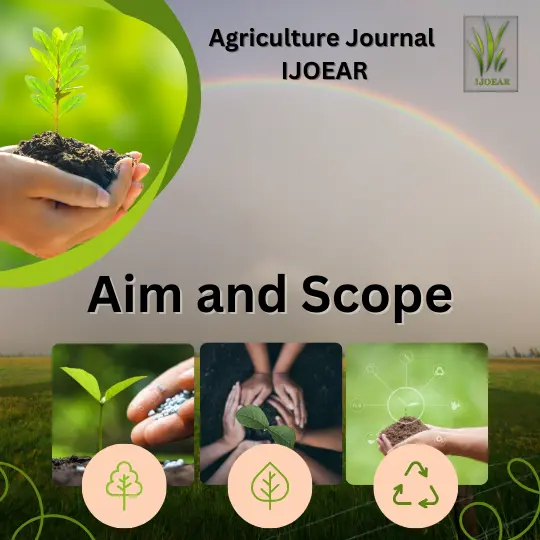 November 2025 Articles
November 2025 Articles Impact Factor: 6.69
Impact Factor: 6.69  Submit Article
Submit Article 
|
Citation Indices
|
All
|
Since 2020
|
|
Citation
|
6164
|
5117
|
|
h-index
|
31
|
29
|
|
i10-index
|
201
|
165
|
|
Acceptance Rate (By Year)
|
|
|
Year
|
Percentage
|
|
2024
|
11.09%
|
|
2023
|
15.23%
|
|
2022
|
12.81%
|
|
2021
|
10.45%
|
|
2020
|
9.6%
|
|
2019
|
14.3%
|
|
2018
|
17.65%
|
|
2017
|
16.9%
|
|
2016
|
22.9%
|
|
2015
|
26.1%
|

The International Journal of Environmental and Agriculture Research (IJOEAR) aims to provide a global platform for researchers and academicians to publish innovative and impactful research in the fields of Environmental and Agriculture Sciences. The journal focuses on advancing practical research outcomes and fostering knowledge dissemination for teaching, reference, and development purposes.
As a double-blind peer-reviewed, open-access journal, IJOEAR prioritizes rapid publication while maintaining the highest standards of integrity and authenticity. The journal also encourages collaboration by recognizing international perspectives in Environmental and Agriculture research.
The scope of Agriculture Journal IJOEAR encompasses a wide array of topics in Environmental and Agriculture Science, including but not limited to:
The journal welcomes original theoretical and applied research that contributes to a deeper understanding of these disciplines. It serves as a critical medium for advancing global knowledge and addressing challenges in agriculture and environmental sustainability.
An Open Access publication provides free and unrestricted access to its content under the following conditions:
Authors and copyright holders grant users a worldwide, irrevocable license to access, copy, distribute, and display the work for any responsible purpose, subject to proper attribution. Users can also create derivative works and make limited printed copies for personal use.
A complete version of the work, including supplemental materials, is deposited in at least one online repository upon publication. This repository is supported by a recognized academic institution, scholarly society, government agency, or organization committed to unrestricted access and long-term archiving.
Note: Community standards, rather than copyright law, ensure proper attribution and responsible use of published work.